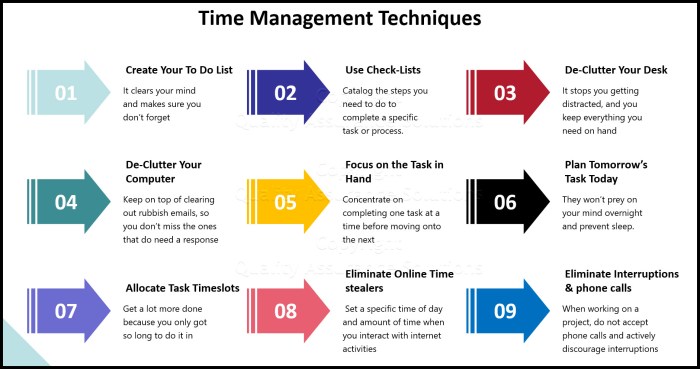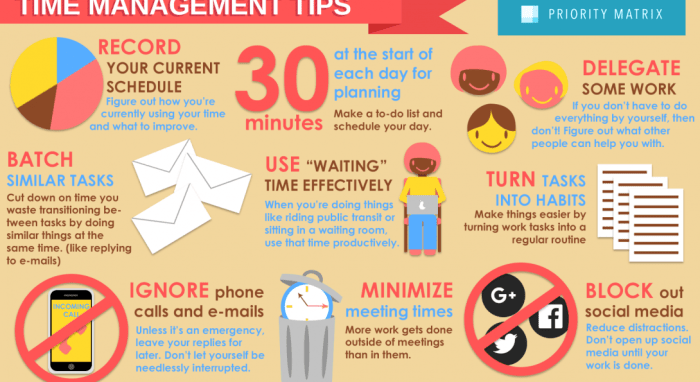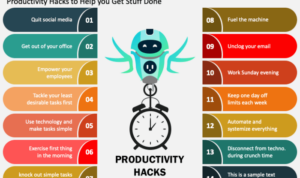Time Management Tips: Get ready to level up your time management game with these killer strategies that will skyrocket your productivity and efficiency. From prioritizing tasks to overcoming procrastination, this guide has got you covered with everything you need to know to crush your goals.
Importance of Time Management
Time management is a crucial skill that impacts both our personal and professional lives. It involves the ability to plan and control how you spend your time in order to effectively accomplish your goals and tasks.
Increased Productivity
Effective time management can lead to increased productivity in various ways. By prioritizing tasks, setting realistic goals, and creating a schedule, individuals can optimize their time and focus on important activities. This can result in completing tasks efficiently and achieving better outcomes.
Consequences of Poor Time Management
- Procrastination: Putting off tasks can lead to a pile-up of work and increased stress levels.
- Missed Deadlines: Failing to manage time effectively can result in missing deadlines, which can have negative consequences in both personal and professional settings.
- Decreased Quality of Work: Rushing through tasks due to poor time management can lead to a decrease in the quality of work produced.
- Impact on Health: Constantly feeling overwhelmed and stressed due to poor time management can have negative effects on physical and mental health.
Time Management Techniques
Effective time management is crucial for success in any endeavor. There are various techniques that individuals can use to improve their time management skills. Let’s explore some popular techniques and how they can be implemented in real-life scenarios.
Pomodoro Technique
The Pomodoro Technique involves breaking down work into intervals, typically 25 minutes, separated by short breaks. This technique helps maintain focus and productivity by allowing short bursts of work followed by brief rest periods. It is useful for tasks that require intense concentration and can be easily implemented using a timer or a Pomodoro app.
Eisenhower Matrix
The Eisenhower Matrix, also known as the Urgent-Important Matrix, categorizes tasks based on their urgency and importance. Tasks are divided into four quadrants: important and urgent, important but not urgent, urgent but not important, and neither urgent nor important. This technique helps prioritize tasks effectively and ensures that time is spent on activities that align with long-term goals.
Eat That Frog
The Eat That Frog technique, inspired by Brian Tracy’s book, encourages tackling the most challenging task of the day first. By completing the most daunting task early on, individuals can boost their productivity and motivation for the rest of the day. This technique is ideal for overcoming procrastination and increasing efficiency.
Time Blocking
Time blocking involves scheduling specific blocks of time for different tasks or activities. By allocating dedicated time slots for work, meetings, breaks, and personal activities, individuals can create a structured routine that minimizes distractions and maximizes productivity. This technique is beneficial for maintaining work-life balance and ensuring that all important tasks are completed.
Batching
Batching involves grouping similar tasks together and completing them in one go. This technique helps reduce mental fatigue and increase efficiency by focusing on a specific type of task at a time. For example, responding to emails in batches or completing all writing tasks consecutively can save time and improve overall productivity.
Task Prioritization
Task prioritization is a fundamental time management technique that involves ranking tasks based on their importance and deadlines. By identifying high-priority tasks and tackling them first, individuals can ensure that critical work is completed on time. This technique is essential for meeting deadlines and managing workload effectively.
Prioritizing Tasks

When it comes to effective time management, prioritizing tasks is key. By determining what needs to be done first and focusing on the most important tasks, you can maximize your productivity and ensure that you are making the most of your time.
Identifying Urgent vs. Important Tasks
In order to prioritize tasks effectively, it’s crucial to be able to distinguish between urgent and important tasks. Urgent tasks are those that require immediate attention and have a deadline, while important tasks are those that contribute to long-term goals or have a significant impact on your overall objectives.
- Use the Eisenhower Matrix: This tool helps you categorize tasks based on their urgency and importance, allowing you to prioritize them accordingly.
- Consider the consequences: Think about the potential outcomes of completing or not completing a task to determine its priority level.
Creating a Task List Based on Priorities
Once you have identified urgent vs. important tasks, it’s essential to create a daily or weekly task list that reflects your priorities. This will help you stay organized and ensure that you are focusing on the right things at the right time.
- Start by listing all tasks: Write down everything that needs to be done, big or small.
- Assign priority levels: Use numbers or color-coding to indicate the priority of each task based on its urgency and importance.
- Review and adjust: Regularly review your task list to make sure you are still on track and adjust priorities as needed.
Overcoming Procrastination: Time Management Tips
Procrastination is a common issue that many people struggle with, often leading to decreased productivity and increased stress. It’s important to identify the reasons behind procrastination and learn effective strategies to overcome it.
Identifying Common Reasons for Procrastination, Time Management Tips
- Fear of failure or perfectionism: Sometimes, the fear of not meeting high standards can lead to procrastination.
- Lack of motivation: When tasks seem overwhelming or uninteresting, it’s easy to put them off.
- Poor time management skills: Not knowing how to effectively manage time can result in procrastination.
Tips and Tricks for Overcoming Procrastination
- Break tasks into smaller steps: By dividing tasks into manageable chunks, it becomes less daunting and easier to get started.
- Set specific goals and deadlines: Having clear objectives and deadlines can help create a sense of urgency and motivation.
- Eliminate distractions: Identify and remove distractions that may be hindering your focus and productivity.
Personal Experiences in Conquering Procrastination
By implementing the Pomodoro Technique, I was able to break my work into focused intervals, followed by short breaks. This method helped me stay on track and avoid procrastination.
Setting SMART Goals
Setting SMART goals is a crucial aspect of effective time management. SMART stands for Specific, Measurable, Achievable, Relevant, and Time-bound. By following this framework, individuals can create clear and actionable goals that contribute to better time allocation and productivity.
Examples of SMART Goals in Time Management
- Specific: Finish reading one chapter of a book by the end of the week.
- Measurable: Exercise for 30 minutes every day for a month.
- Achievable: Complete a project report within two weeks by working on it for one hour each day.
- Relevant: Attend a time management workshop to improve organizational skills within the next month.
- Time-bound: Reduce social media usage to 30 minutes per day for the next two weeks.
Benefits of Setting SMART Goals
- Enhanced Focus: SMART goals provide a clear direction and focus on what needs to be accomplished.
- Measurable Progress: The specific and measurable nature of SMART goals allows individuals to track their progress effectively.
- Increased Motivation: Achieving SMART goals within a set timeframe can boost motivation and confidence.
- Improved Time Management: Setting SMART goals helps individuals prioritize tasks and allocate time wisely.
Delegation and Outsourcing
Delegation and outsourcing are crucial aspects of effective time management, allowing individuals to focus on high-priority tasks while efficiently handling other responsibilities.
Importance of Delegation
Delegating tasks can help distribute workload evenly, maximize productivity, and utilize the skills and strengths of team members effectively. By assigning tasks to others, individuals can free up time for more important and strategic activities.
- Delegate tasks based on team members’ expertise and strengths.
- Clearly communicate expectations and deadlines when assigning tasks.
- Provide necessary resources and support to ensure successful task completion.
- Regularly follow up on delegated tasks to track progress and offer guidance if needed.
- Recognize and appreciate team members for their contributions and efforts.
Outsourcing for Time Efficiency
Outsourcing tasks to external professionals or services can be a smart strategy to save time and focus on core responsibilities. It allows individuals to leverage specialized skills and expertise without investing extensive time and resources in training.
- Identify tasks that can be outsourced, such as administrative work, graphic design, or social media management.
- Research and select reputable outsourcing partners or platforms to ensure quality results.
- Clearly define project requirements, deadlines, and expectations when outsourcing tasks.
- Regularly communicate with outsourced partners to provide feedback and monitor progress.
- Evaluate the cost-benefit of outsourcing versus handling tasks internally to make informed decisions.
Technology Tools for Time Management

In today’s fast-paced world, utilizing technology tools for time management has become essential for staying organized and productive. These tools can help individuals prioritize tasks, set deadlines, and track progress efficiently. Let’s explore some popular time management apps and tools to enhance your productivity.
1. Todoist
Todoist is a versatile task management app that allows users to create to-do lists, set reminders, and collaborate with others. Its user-friendly interface and synchronization across multiple devices make it a top choice for individuals looking to streamline their daily tasks.
2. Trello
Trello is a visual project management tool that uses boards, lists, and cards to organize tasks and projects. Users can easily drag and drop tasks, set deadlines, and assign team members to specific tasks. It is ideal for individuals who prefer a more visual approach to task management.
3. Google Calendar
Google Calendar is a widely used calendar app that helps users schedule appointments, set reminders, and share events with others. Its integration with other Google services like Gmail and Google Drive makes it a convenient tool for managing both personal and professional schedules.
4. RescueTime
RescueTime is a time tracking tool that provides insights into how users spend their time on digital devices. By analyzing computer usage patterns, users can identify time-wasting activities and make adjustments to improve productivity. It is suitable for individuals looking to optimize their daily routines.
5. Focus@Will
Focus@Will is a music streaming service designed to enhance focus and productivity. It offers scientifically curated music playlists that help users concentrate on their tasks and minimize distractions. This tool is recommended for individuals who find background music beneficial for their workflow.
6. Evernote
Evernote is a note-taking app that allows users to capture ideas, create task lists, and store important documents in one place. Its search functionality and cloud synchronization make it easy to access information across devices. Evernote is ideal for individuals who prefer to keep all their notes and ideas organized digitally.
7. Forest
Forest is a unique productivity app that encourages users to stay focused by planting virtual trees. By setting a timer for work sessions, users can grow a forest of trees if they resist the temptation to use their phones. This app is perfect for individuals who struggle with distractions and need a fun way to boost their productivity.
